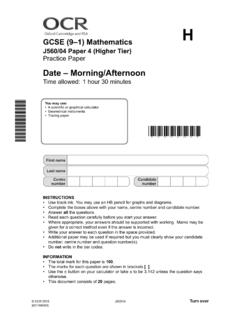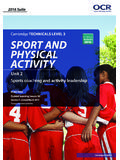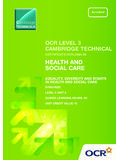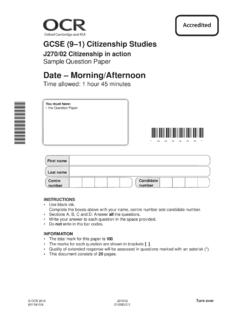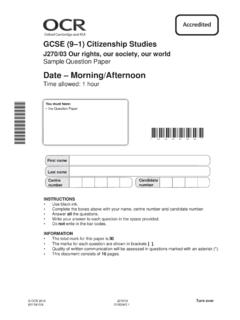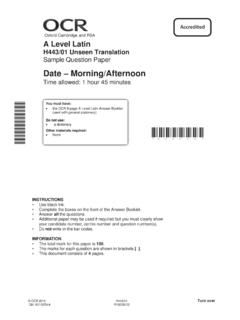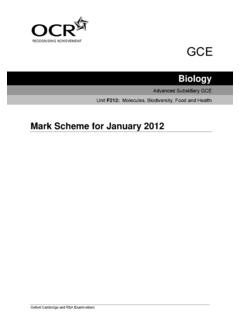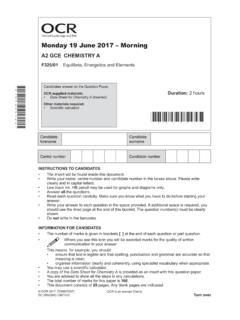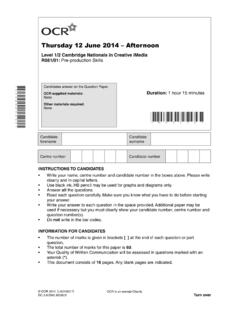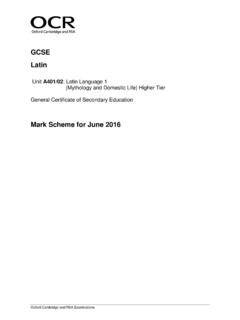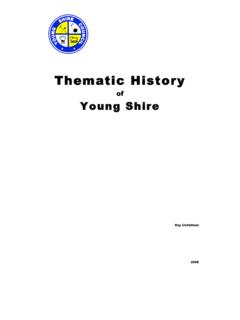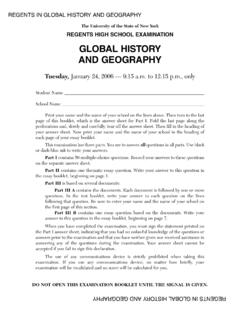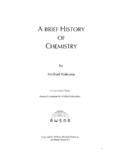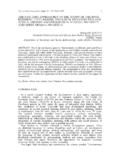Transcription of OCR Entry Level R435 History Specification
1 Oxford Cambridge and RSAENTRY Level CERTIFICATES pecificationQualificationRegulatedEntry Level CertificateHistoryHISTORYR435 For first assessment in 2017 Version (September 2018)DISCLAIMERS pecifications are updated over time. Whilst every effort is made to check all documents, there may be contradictions between published resources and the Specification , therefore please use the infor-mation on the latest Specification at all times. Where changes are made to specifications these will be indicated within the document, there will be a new version number indicated, and a summary of the changes. If you do notice a discrepancy between the Specification and a resource please contact us at: will inform centres about changes to specifications. We will also publish changes on our website. The latest version of our specifications will always be those on our website ( ) and these may differ from printed OCR 2016 Entry Level Certificate in HistoryContents1 Why choose an OCR Entry Level Certificate in History ?
2 11a. Why choose an OCR qualification? 11b. Why choose an OCR Entry Level Certificate in History ? 21c. What are the key features of this Specification ? 31d. What is new in OCR Entry Level Certificate in History (R435) 41e. How do I find out more information? 42 The Specification overview 52a. OCR s Entry Level Certificate in History (R435) 52b. Content of Thematic Study 62b. Content of Period Studies 92b. Content of the Site or Individual Study 142c. Prior knowledge, learning and progression 153 Assessment of Entry Level Certificate in History 163a. Forms of assessment 163b. Assessment objectives (AO) 173c. Assessment availability 183d. Retaking the qualification 183e. Internal assessment tasks 183f. Study of a Site and Individual marking criteria 193g.
3 Calculating qualification results 214 Admin: what you need to know 224a. Pre-assessment 224b. Access arrangements and special consideration 234c. Administration of non-examined assessment 244d. Results and certificates 264e. Post-results services 264f. Centre Malpractice guidance 265 Appendices 275a. Awarding of grades 275b. Overlap with other qualifications 275c. Key skills sections 275d. Files 28 Summary of updates 291 OCR 2016 Entry Level Certificate in History1 Choose OCR and you ve got the reassurance that you re working with one of the UK s leading exam boards. Our new Entry Level Certificate in History has been refreshed to fit with reformed GCSE (9 1) History qualifications to provide learners with a qualification that s relevant to them and meets their needs.
4 We re part of the Cambridge Assessment Group, Europe s largest assessment agency and a department of the University of Cambridge. Cambridge Assessment plays a leading role in developing and delivering assessments throughout the world, operating in over 150 work with a range of education providers, including schools, colleges, workplaces and other institutions in both the public and private sectors. Over 13,000 centres choose our A Levels, GCSEs and vocational qualifications including Cambridge Nationals and Cambridge SpecificationsWe believe in developing specifications that help you bring the subject to life and inspire your students to achieve more. We ve created teacher-friendly specifications that are designed to be straightforward and accessible so that you can tailor the delivery of the course to suit your needs. We aim to encourage students to become responsible for their own learning, confident in discussing ideas, innovative and Entry Level Certificate in History is made up of 100% internally assessed tests and tasks.
5 The flexibility allowed through this approach to assessment will allow you to take any issues into account in your planning that may affect your learners performance. We provide support services designed to help you at every stage, from preparation through to the delivery of our specifications. This includes: An extensive, high-quality exemplar task booklet Access to Subject Advisors to support you through the transition and throughout the lifetime of the Entry Level Certificate qualifications offered by OCR are regulated by Ofqual, the Regulator for qualifications offered in England. The accreditation number for OCR s Entry Level Certificate in History is 603/0099 Why choose an OCR Entry Level Certificate in History ?1a. Why choose an OCR qualification?2 OCR 2016 Entry Level Certificate in History11b. Why choose an OCR Entry Level Certificate in History ?It is our strong desire to ensure that OCR History , at all levels, should captivate learners and develop a desire within them to continue learning beyond the confines of the classroom.
6 It is also our desire that teachers should be able to provide an OCR Entry Level Certificate in History in a variety of different ways and Entry Level Certificate in History provides a fantastic curriculum for learners to ignite and engage their passions and interests. Our content will aim to create independent learners, critical thinkers and decision makers all personal assets that can make them stand out as they progress to further education and/or the workplace. This is just as true for those learners who may not be able to access the GCSE (9 1) curriculum. We want to be able to offer a recognised and meaningful qualification in History to all learners, regardless of prior attainment or will adhere to the GCSE (9 1) History content in an innovative, attractive and valid way. Aims and learning outcomesAlongside the new GCSE (9 1) specifications, we want Entry Level History to enable learners to.
7 Develop and extend their knowledge and understanding of specified key events, periods and societies in local, British and wider world History develop and extend their knowledge of the wide diversity of human experience engage in historical enquiry to develop as independent learners and as critical and reflective thinkers develop the ability to ask relevant questions about the past, to investigate issues critically and to make valid historical claims by using a range of sources in their historical context develop an awareness of why people, events and developments have been accorded historical significance and how and why different interpretations have been constructed about them organise and communicate their historical knowledge and understanding in different ways and reach substantiated OCR 2016 Entry Level Certificate in History11c. What are the key features of this Specification ?
8 OCR Entry Level Certificate in History provides both you and your learners with a wide choice of exciting topics to study. These range from Crime and Punishment, to modern American History , to the Vikings. You can choose topics to match your centre s resources and your learners interests. You can also base your selection on providing your learners with a number of varied topics to maintain their interest and motivation. Our Entry Level Certificate in History offers a great deal of flexibility. Learners have to complete three pieces of work for assessment. These tasks are set by your centre so that you can target your learners interests. The tasks can be structured or can allow more extended writing to suit the abilities of the task booklet of exemplar materials has been produced which teachers are free to use or adapt for the first two tasks if they would the first and second tasks, learners have to study one of five thematic studies, and one of eight depth studies.
9 Once these two areas have been chosen, you and your learners can decide which topics interest them the third task, our OCR Entry Level Certificate in History also provides learners with the opportunity to choose either a famous individual from the past in whom they are particularly interested, or an historical site. They can carry out some research on the individual or site and present their findings in a variety of ways, by designing pages for a website or producing a wall display or a cartoon the areas of content and the Assessment Objectives in our Entry Level are based on any GCSE (9 1) History specifications, there is easy progression from one to the other. More content coverage will be required for GCSE (9 1) but learners moving from Entry Level will have made a strong start both in terms of content and OCR 2016 Entry Level Certificate in History11d. What is new in OCR Entry Level Certificate in History (R435)This section is intended for teachers using OCR s Entry Level Certificate in History .
10 It highlights the differences between the current Entry Level Certificate (R434) and the new version for first teaching from September 2016:What stays the same?What s changing? Many of the topics remain the same All the work is internally-assessed and externally-moderated The piece of work on either a chosen individual or a chosen site remains 400 words long Learners can still submit their work in a variety of media (such as essays, PowerPoint presentations, posters) Centres have the flexibility to teach this as a separate course or within GCSE (9 1) or other classes to allow co-teachability with GCSE courses. Learners must study three areas of content instead of two Learners must complete four pieces of work instead of three Some new areas of content have been added and some removed to reflect the changes to new GCSE (9 1) specifications The assessment objectives have been revised to match new GCSE (9 1) assessment objectives The thematic study and the period study will be marked through a mixture of points based and levels based mark schemes.
